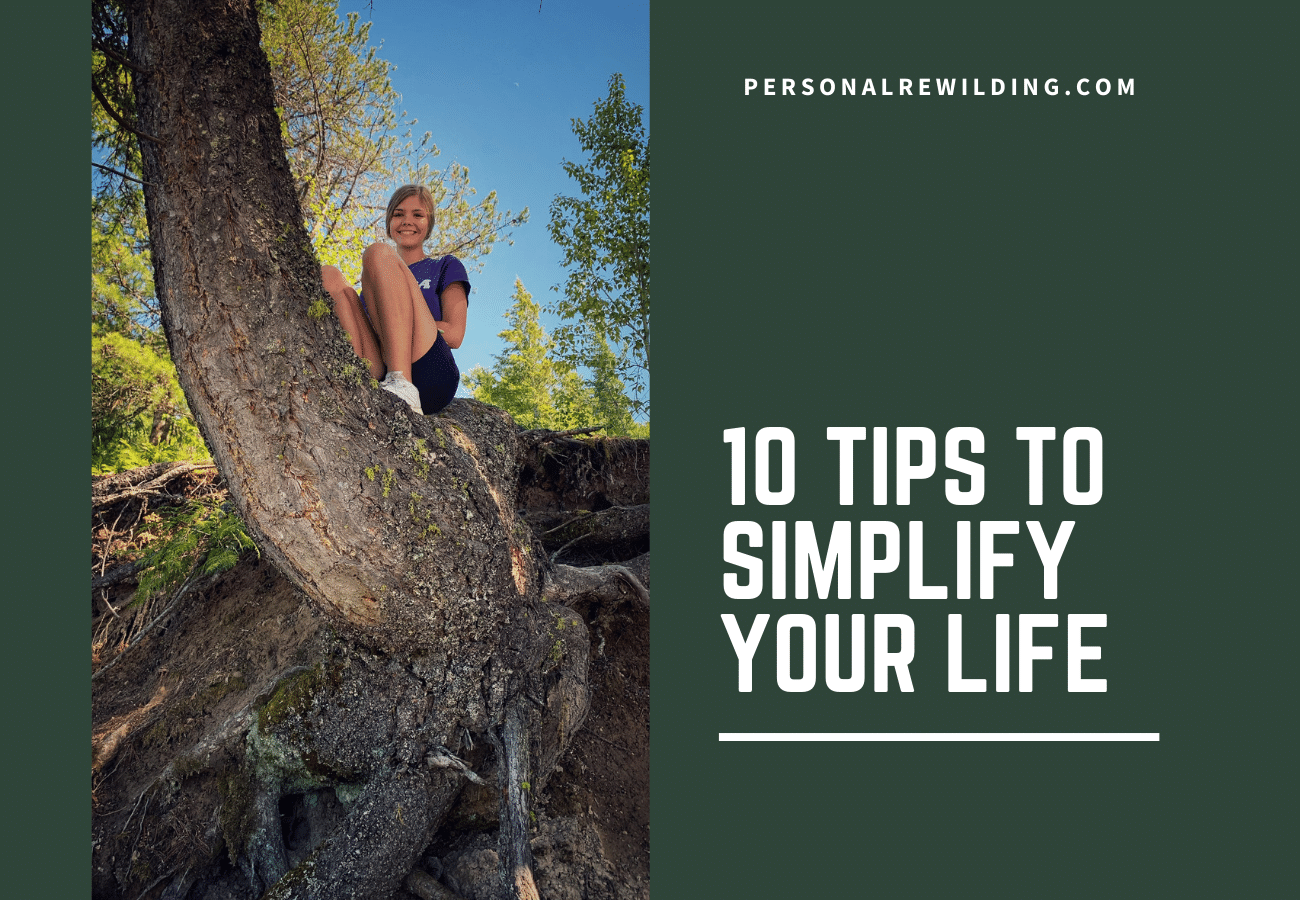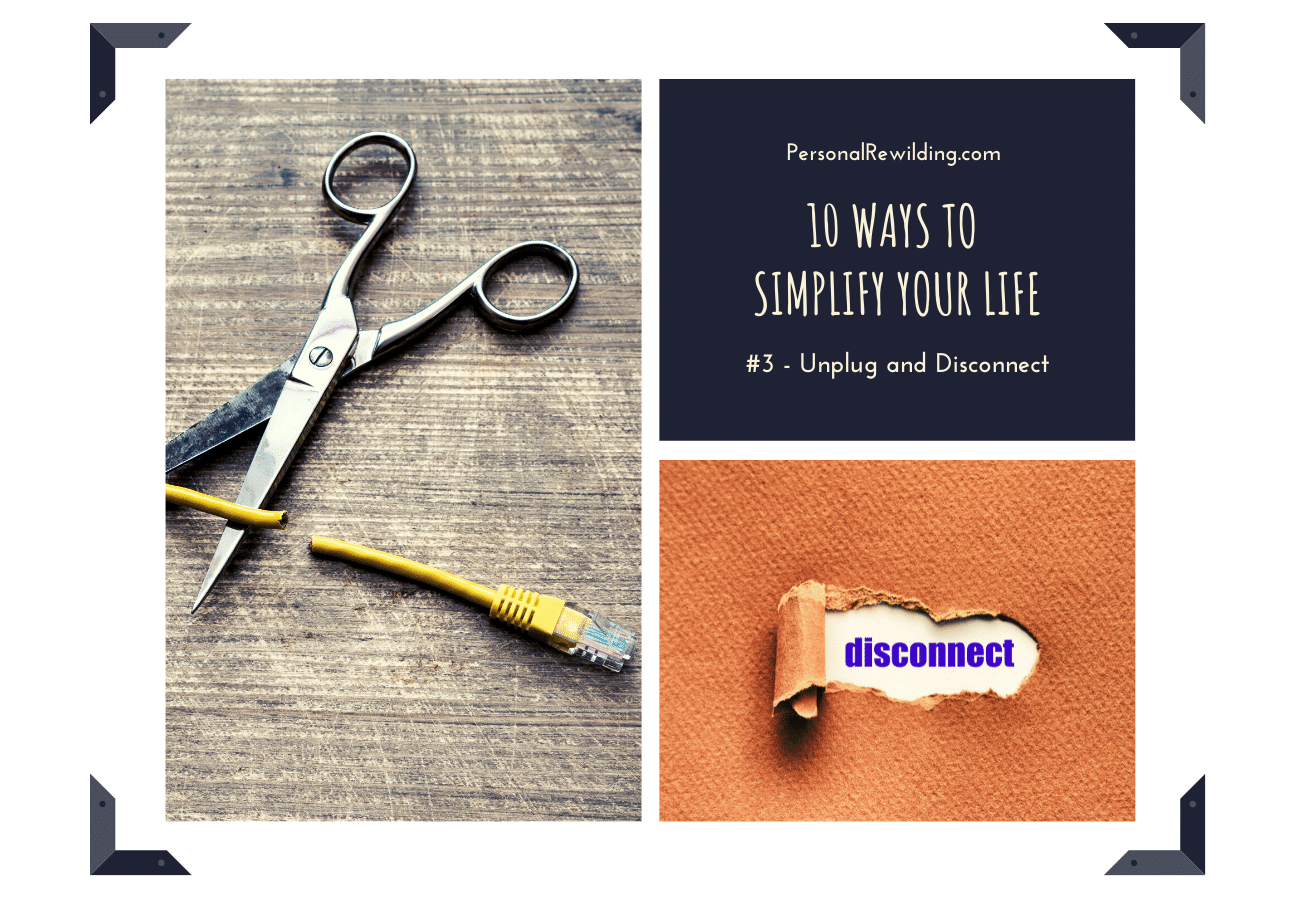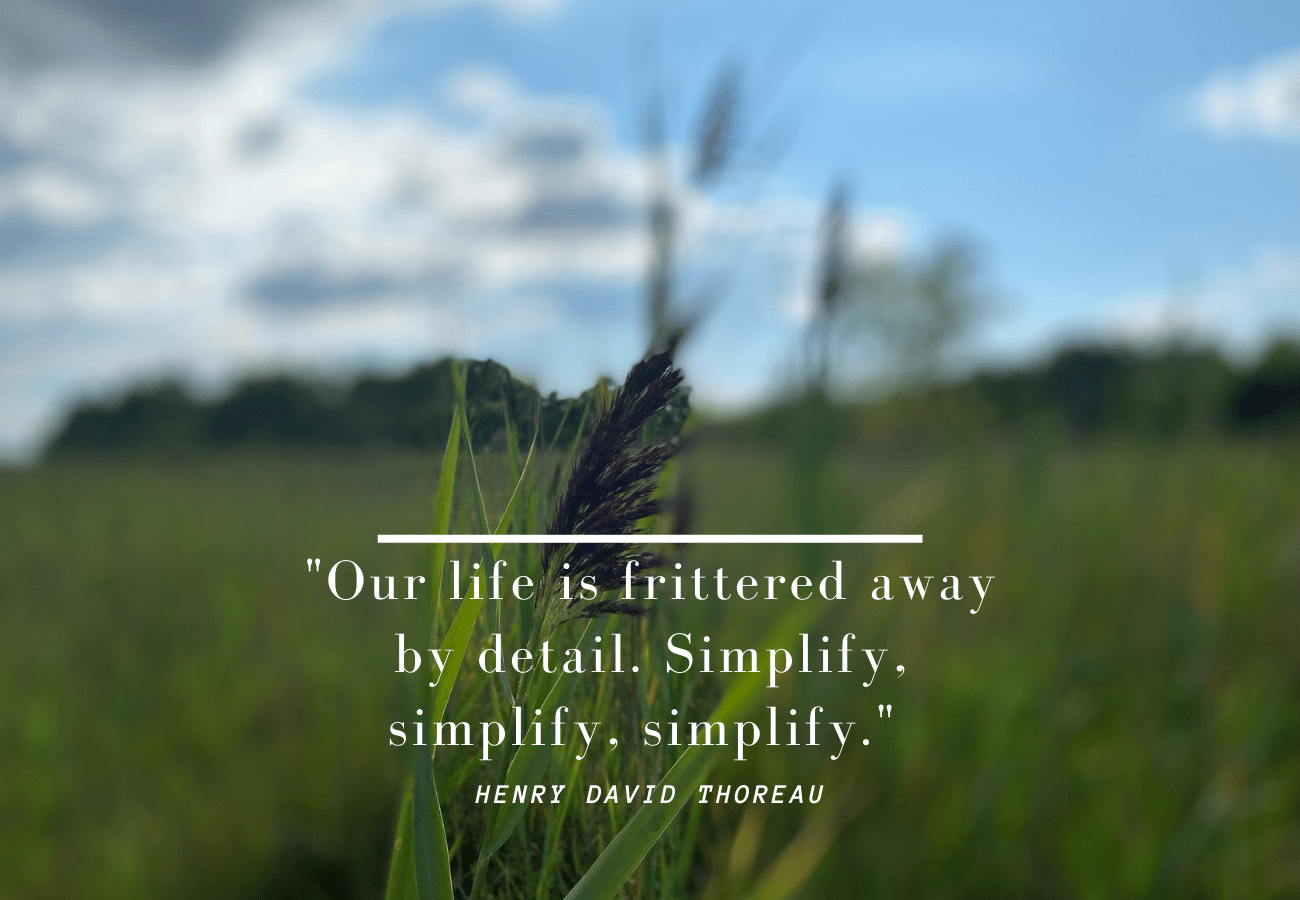- Home
- How To Live Simply
- Simplify Your Life
Simplify Your Life
An important aspect of Personal Rewilding is learning how to simplify your life. Simplification has enormous benefits to individual happiness as well as physical and mental health.
Learning to simplify your life is a big undertaking, but it doesn’t all have to be done at once. It can be accomplished in a series of simple steps. There are many ways to make your life less complex, less hectic, less stressful, and far happier and more rewarding.
The most important thing to remember is that simplifying your life is not an event but a continuous process. Your goals will evolve, just as you will evolve through the process.
Here are our top 10 tips to simplify your life:
10 Tips to Simplify Your Life
Reduce Your Possessions
We are barraged daily with products, advertising, and gimmicks. We have been conditioned to believe that “success” looks like new cars, big houses, fancy electronics, collectibles, excess clothing, boats, pools, and a thousand other toys.
We work long hours and give years of our lives to the pursuit of “more, bigger, and better”. And yet somewhere in the midst of this pursuit, we realize that the buyer’s high of shopping and purchasing is an empty game that we have no chance of winning.
One of the first and biggest steps that you can take to simplify your life is to begin sloughing off all the excessive things you’ve accumulated, and which can suffocate your contentment. It’s unnecessary, it’s expensive, and it’s time-consuming. All that disorganized clutter, all the “wants” on your list, feed a state of anxiety.
The minimalist movement has built a loose set of rules around how to reduce your possessions. Start with a single small space. Maybe a guest bedroom or a small living space. Take everything out of the drawers, closets, cabinets, shelves, etc… Pile it up in the center of the room and then begin sorting through it.
The rules are this: get rid of everything that does not have an express purpose. If you haven’t used something in a year, it’s safe to say it can go. Start with non-sentimental items like clothing, mail, cookware, or trinkets. Reduce, reduce, reduce. You’ll be shocked by how little you'll miss the things you get rid of. And you’ll get better at determining what can go as you move forward.
Keep only what you use or that which has value in your life, recycle or donate where it makes sense, and discard the rest. If you start with a single room, you’ll begin to realize the impact of this exercise. It will make you feel lighter, less encumbered, and far more organized.
Stop Buying Unnecessary Things
This is the logical and necessary second step to reducing your possessions. If you want to simplify your life, you need to find a way to stop buying unnecessary things.
This is more difficult than it sounds because we have been conditioned by our environment to be consumers. Shopping is like sugar, a quick and empty dopamine high that we know is unhealthy but that we unconsciously crave.
There are few ways to accomplish this:
Wait a day – or more – before making an impulse purchase
Waiting a day – or longer – to make a purchase is a proven way to help reduce impulse buying. Many times, you’ll forget entirely about that item you wanted. Other times, your need for that item will look entirely different in the light of new day.
Determine that for every item you buy, two items have to go
Reducing your possessions is a great first step, but it will only snowball back into its original state without the commitment to maintain an equilibrium between incoming and outgoing goods. It will also make you ask the question: “If I buy this, what has to go?”
Stop comparing yourself to others
Social media and our skewed ideas of “success” (ie, owning lots of goods) means that we are constantly comparing ourselves to our family, friends, neighbors, and co-workers. That shiny new truck, the state-of-the-art fridge, or the designer shoes all feel important when someone else has them.
It’s important to realize that each of these items is a choice with consequences and a potential albatross around your neck. Do you need it? Will the item (and its associated costs and burdens) make a lasting, meaningful difference in your life for the better? If the answer is no, move on by and don’t look back.
Focus on experiences, not things
This one is a bit of a cliché, but no less true for all of that. If you want to simplify your life and fill it with moments of lasting impacts, spend your time and money on experiences, not goods. Travel and adventure may seem to be fleeting things – and in a sense they are – but they leave a much deeper impression and a lasting impact on us that material goods do not.
Unplug from Technology
Technology is pervasive and has seeped into every corner of our daily lives. We use it for news, communication, work, meal planning, socialization, shopping, movies, music, maps, games… The list is nearly endless.
And yet this little box of miracles has a dark side. We’re always connected to the wider world – to news and friends and work obligations. If you want to simplify your life, you need time away, time to think and recharge unburdened by the constant need for connection.
We need to spend time in nature when we are only with nature, when our moments are not recorded and broadcast like a walking reality show.
With this, like with everything else, start small. Set aside one hour of your day when you are going to shut off your phone and your other technology. Set it aside, put it away, try not to touch it outside of an actual emergency.
If necessary, tell your friends and family and employer that you are doing this. Let it be known that between (for example) 6-7 PM every day, you will be out of touch. This is YOUR time, unconnected to the outer world.
Slowly start to increase this time, or add elements to it. Determine, for instance, that you are going to spend less time reading the news. Or less time on social media. Set limits on your phone, if necessary, to help remind you to unplug.
It will grow easier over time, and you’ll be shocked by the amount of complication and anxiety you’ll remove from your life.
Reduce Your Obligations
Reducing your obligations is a effective way to free up time, reduce stress, and simplify your life.
Most of us are busy. Busy-ness has become the status quo. Ask any person you haven’t seen in awhile how things are going, and 90% of them will answer with some variation of “busy”.
It has become an expectation that our lives are filled up with activity. Some activity and socialization is healthy, but being constantly “on” and on-the-go is not a healthy state. Constant busy-ness is stressful, overwhelming, and harmful to mental health.
We need time for quiet, time to recharge, and time for self-reflection. Our minds and bodies require recreation and meditation.
Make a list of all the activities – over the course of, say, a month – that contribute to your sense of busy-ness. Try to include everything. All the obligations, all the electives. You’ll be surprised by the size of the list.
Now determine how many of those are really rewarding or necessary, as well as how many can be consolidated or even refused. It's incredibly liberating to say “no” to unwelcome or untimely invitations or obligations.
Reconsider all those things that aren’t rich and meaningful to your life. The committees, the extra tasks, the extracurricular activities, even the volunteerism. Keep those that make you feel useful, enriched, and accomplished and get rid of the rest.
The same is true of the obligations of your children and family. Many people feel that they are doing their children a favor by signing them up for multiple activities, keeping them constantly occupied, but children also need down time. They need time alone, time to reflect and recharge.
Organize Your Paperwork & Finances
One of the great sources of clutter and stress in our lives is our paperwork and finances. These often go together, because disorganized paperwork = disorganized finances.
If you want to simplify your life, you must create and maintain an organizational system. We all know how quickly bills, junk mail, receipts, newspapers, tax forms, and other ephemera can accumulate. It quickly becomes overwhelming, torpedoing your attempts to declutter your life and having a negative effect on your frame of mind and your finances.
Develop a quick and easy sorting system for mail and documents. Bills to be paid should go into one basket. Receipts or other important documents should go directly into a filing system. Junk mail should be shredded or disposed of directly into a paper recycling container. Don't keep it around to accumulate. Dispose of it!
Invest in some organizational storage for your documents. Utilize a filing cabinet for your important paperwork such as tax forms, healthcare documents, mortgage agreements. The more organized you are and remain, the less anxiety you’ll feel when you need to find an important file.
This is also an opportunity to store and organize documents electronically. Automate as many bills as you can. It's one less duty for you to worry about. Scan important documents and store them in the cloud, rather than keeping physical copies, whenever possible.
Get Out In Nature
One of the cornerstone elements to simplify your life is building time in your schedule to connect with nature. We talk about this extensively throughout the rest of the site, but a connection to nature is a missing ingredient in many people’s lives.
Getting outdoors has a beneficial effect on our physical and mental health. Like a plant, our bodies require sunlight and fresh air. Time spent in nature helps to regulate our moods and our sleep cycle, lowers blood pressure, and has a host of other benefits.
Plan a daily walk in nature or opt for a host of other outdoor activities, such as kayaking or bird watching. If you’re feeling less physical, take your coffee and your book outside to enjoy the benefits of nature. Or spend an hour napping in a hammock. Simplicity and contentment come with making choices to opt out of “busy” time in preference to something more restorative and meaningful.
Set Goals
Goal setting is an important step in accomplishing and maintaining a simpler life. All the changes we’ve outlined already – reducing possessions, organizing, decluttering – require planning and action. They can seem large and overwhelming at first.
Setting yourself small goals with timelines to accomplish them, and holding yourself accountable to those goals, is vital to managing and maintaining any life change.
Start with something small, write it down so that it’s “physical” and stick to it. Schedule yourself a weekend “jump start” on your goals. Set yourself a 30-day goal and work with your significant other and family to accomplish it. No person is an island, so involve your family in your goals, explain the benefits, and make them their goals as well.
Prioritize Your Health & Happiness
Learning to simplify your life is learning to prioritize your health and happiness. For many of us, those troublesome obligations, the busy-ness that eats our lives, are a product of our desire to please others.
Learning to prioritize your own needs – physically and psychologically – is key to living a simpler and happier life. Schedule yourself at least 45 minutes each day of physical activity. This can be a gym or home workout, a nature walk, a run, a bike ride, whatever calls to you. This is not easy, especially for those living hectic minute-to-minute lives.
Make this one of your earliest and highest priority goals.
This is where reducing obligations and time commitments pays dividends. Putting the priority on physical activity – preferably in nature when possible – will improve your mental and physical health, your energy level, your moods, your sleep, and your outlook on life.
Prioritize Healthy Relationships
There is a business concept called the 80/20 rule (or Pereto Principle) that stipulates that 80% of outcomes come from 20% of causes.
This rule can be applied to many areas of life, but it is especially apt in relationships. 80% of the stress and problems in our interpersonal relationships can be ascribed to just 20% of our friends and family.
We all know the few friends or family members that bring drama into every situation. They complicate issues, they dump their problems on you, they require your constant attention, they’re unpleasant or argumentative, or they need your help (monetarily or otherwise) regularly.
Unlike in business, it usually isn’t possible to eliminate that 20%, nor would you want to. They’re friends and family, after all. But it is possible to make yourself less available and flexible to meet the needs of that individual on all occasions.
Prioritize by apportioning more time to yourself and to those relationships in your life that bring you more personal satisfaction. Whoever makes you feel the most relaxed, the most “yourself” in their presence, give those people the priority of your time. You (and they) deserve it.
Simplify Your Routines
We all have routines, but one important building block to simplify your life is simplifying and regulating some of those routines.
We’re not advocating that you live your life by routine – variety and adventure are necessary to a happy and well-adjusted life – but to simplify and be more consistent in those daily routines. For example, if you are prioritizing your health as suggested above, maintaining a healthy and consistent sleep/wake routine is extremely important.
So are other routines, such as:
- Sorting and filing your incoming mail
- Planning meals in advance to minimize wasteful trips to the store
- Rising a few minutes earlier in the morning to eliminate stressful rushing
- Getting out for a daily walk
- Create a weekly schedule of events/obligations
- Plan your wardrobe the night before
- Prepare breakfast items before bed
Each of these will remove the rushed, stressful burden of a busy morning or help to maintain some part of your simpler, decluttered lifestyle. Try to do these regularly, and as close to the same time as possible. Of course, 100% consistency is not how real life works, so you also need to be flexible when the situation calls for it.





